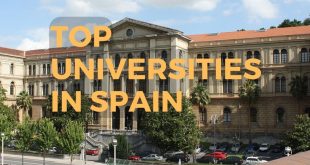Are you looking for a historical destination to study in? Then, you should think of Spain, which is a popular international destination for studying with a range of opportunities available for PhD study in Spain.
Table of Contents
PhD Structure in Spain
The Spanish PhD follows well-defined guidelines on structure and supervision. The University’s Academic Committee organizes it. This committee is usually consisting of specific academics and researchers.
Basically, full-time doctoral studies last in Spain for a duration of maximum three years.
It is also possible to extend the period of enrollment in the doctoral program for a further two years. However, the academic body must approve that.
On the other hand, part-time PhD programs are for five years.
The main activity during the course of the doctoral is research. You may also need to attend training courses and seminars, and participate in other academic activities.
The Spanish doctorate has two stages (CICLOS):
- The first phase (during the first year) focuses on 60 ECTS credit courses.
- The second phase focuses on research and thesis writing.
How to study a PhD in Spain
The criteria for admission and acceptance can vary. However, the applications of the Spanish doctoral dissertation are general and relatively clear.
Application process
Doctoral applications in Spain are submitted directly to the potential academic committee of the University and/or doctoral program. In addition, in the first case, you should contact your program coordinator to gauge the availability of doctoral seats and learn more about the application process at the university or doctoral college.
Doctoral programs in Spain can have different deadlines for application. This usually depends on the university of your choice, research discipline, and any components associated with the training.
However, most Spanish universities will want to receive doctoral inquiries from potential students between January and May, in preparation for the next academic year.
You will usually need to submit additional application materials such as a Research proposal, resume, reviewer, and even an interview. Some official documents may require localized versions in the official Spanish language.
Acceptance requirements
To successfully enroll in a PhD program in Spain, you will usually need to have a BA and a Master’s degree in Spain relevant to the research field. The equivalent scores are acceptable, provided that they correspond to at least 300 points in the European System (ECTS).
Moreover, you will need to recognize other qualifications by the Spanish National Recognition Information Center (NARIC), the Embassy, or the Spanish Consulate.
Learn about Master’s studies in Spain
Language requirements
Although more courses in Spain are in English, many doctoral programs are in Spanish. As a result, you will need to meet the Spanish language requirements of your university. This depends on the University’s individual policy and the structure of the doctoral program.
Student visas
There are many immigration procedures for doctoral study in Spain. The specific details and processes required depend on your country of origin.
International students must obtain a valid student visa (Type D) to enter Spain at first.
The initial study visa is valid for the first three months of residence in Spain. During the first month, you must get a long-term visa by attending in-person to the local diplomatic mission or consulate.
In addition, You must apply for a study visa in Spain (at a Spanish embassy or consulate in your country) before traveling to Spain. Then, the request fee is (EUR 60) and associated with each visa application.
Residency in Spain
All PhD students living in Spain must register in the Central Register of Foreign nationals (Registro Central de Extranjeros) during the first three months of their stay. The application requires similar visa application documentation. You can register in person at the Oficina de Extranjería, or at your accommodation’s local police station.
Completing the registration gives you an “NIE” that enables you to open a Spanish bank account, use Spanish health services, and qualify for student discounts.
Learn also about the study fees and living cost in Spain for international students
PhD programs in Spain for international students
When it comes to PhD programs, universities in Spain have plentiful of options. Whether you are interested in sciences, health sciences, law, social sciences, technological sciences, arts and humanities or other, you will find a suitable program in Spanish universities.
To narrow down the long list for you, here are the top universities in Spain where you can apply for a PhD:
- Autonomous university of Barcelona, offering more than 65 PhD programs. The institution holds the distinction of HR Excellence in Research, making it a safe bet when it comes to academic research in Spain.
- University of Valencia, offering 61 PhD programs
- Complutense University of Madrid, with over 55 PhD degree programs.
- University of Barcelona, which provides 50 PhD programs you can check out.
- University of Zaragoza, offering 47 programs for PhD
- Autonomous University of Madrid, with 42 PhD programs
- University of Salamanca with over 40 programs
You can learn more about some of these universities in our article on the top universities in Spain.
How much does a PhD in Spain cost?
If you choose to study in Spain, you will certainly pay less in tuition fees than many countries in Western Europe. But in general, the cost of a PhD in Spain depends on the university, the research subject as well as the student’s nationality. International students from the EU/EEA region will pay lower fees than those who come outside these countries.
Moreover, tuition fees in Spain use a pay-per-credit basis. In other words, the cost of one credit is multiplied by the number of ECTS credits, and this cost per year, for a PhD program can go up to €55. This brings the total cost to up to €3,300 for the first year, while the following years, students will spend on their research and thesis writing. The costs will then drop significantly since it can go as lesser than €200-€600 per year.
To cover these costs, or at least the bigger amounts, students can apply for a scholarship. There are even fully-funded PhD scholarships for international students and researchers in Spain.
Learn more in our article on the types of scholarships in Spain.




 Aljawaz Your guide to study abroad
Aljawaz Your guide to study abroad













